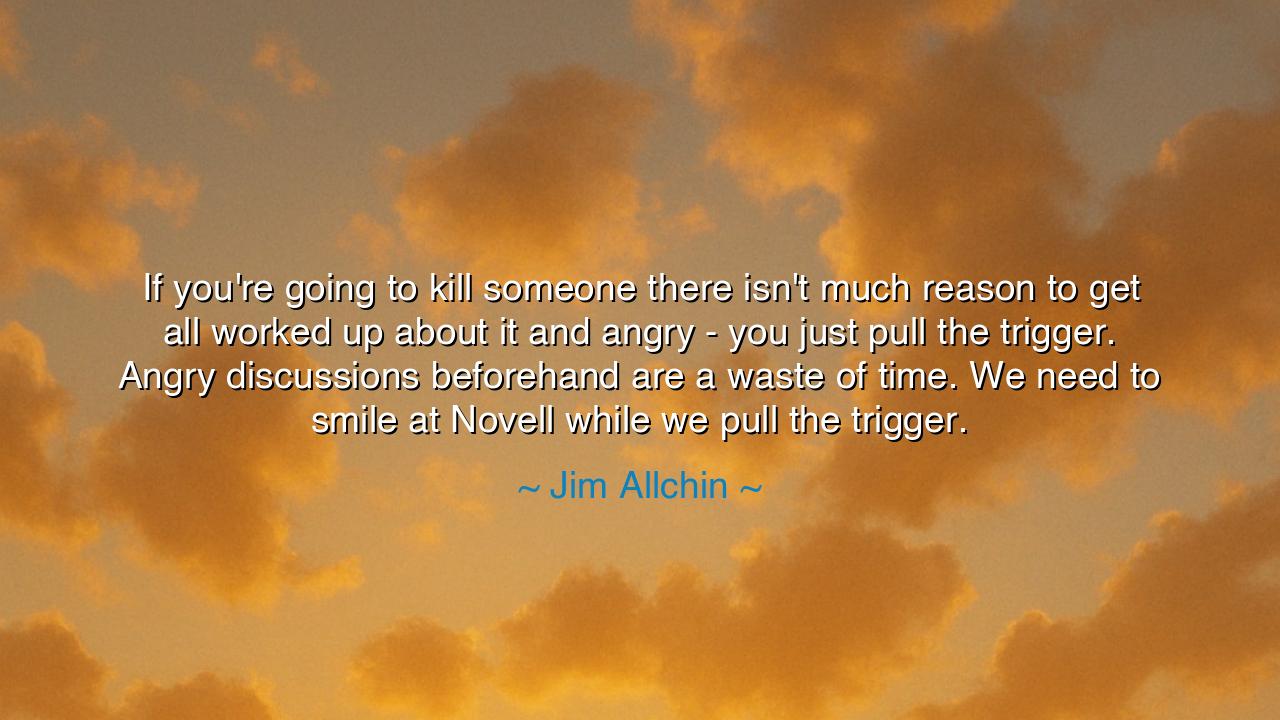
If you're going to kill someone there isn't much reason to get
If you're going to kill someone there isn't much reason to get all worked up about it and angry - you just pull the trigger. Angry discussions beforehand are a waste of time. We need to smile at Novell while we pull the trigger.






Hear the fierce words of Jim Allchin: “If you’re going to kill someone there isn’t much reason to get all worked up about it and angry—you just pull the trigger. Angry discussions beforehand are a waste of time. We need to smile at Novell while we pull the trigger.” Though couched in the language of battle, though spoken of rivals in the marketplace and not of flesh and blood, these words reveal the ancient truth of conflict: that victory belongs not to those who rage without measure, but to those who strike with clarity, calmness, and resolve. The smile he invokes is not kindness—it is composure, the face of one who conquers without losing control.
The ancients themselves spoke often of such poise. The general Sun Tzu declared in The Art of War that anger clouds judgment, and that to go into battle consumed by rage is to invite defeat. Better, he taught, to wait in stillness, to conceal one’s intent behind the mask of serenity, and then to strike when the moment is right. Allchin’s words, though born of corporate rivalry, echo this martial wisdom: do not waste strength on wrath. Save it for the decisive blow, delivered with precision, and even with a smile.
Consider the tale of Hannibal of Carthage. He crossed the Alps with elephants, an impossible feat, yet he did not enter Rome in blind fury. His movements were calculated, his demeanor often calm even amidst chaos. He understood that anger could embolden his men for a moment, but only strategy would sustain them through years of war. So too in the fields of business, politics, and every realm of human struggle, the wise know that anger is a spark that burns quickly—while discipline is the steady flame that carries victory through the long night.
And yet, the smile carries another meaning. To smile while striking is to cloak aggression in courtesy, to lull the opponent into disarmament even as the decisive move is made. History remembers many who wielded such duplicity with mastery. The Romans would speak words of alliance while already preparing the legions. Diplomats of empires would exchange pleasantries even as they plotted conquest. The smile, then, becomes both shield and sword—shield to hide intent, sword to strike when the foe least expects it.
Still, there is a danger here. For while the words of Allchin teach clarity and discipline, they also remind us of the coldness that can creep into the human heart when competition is seen as nothing more than elimination. The ancients warned against this too: Marcus Aurelius, the philosopher-emperor, urged that even in conflict one must remember the shared humanity of the foe. To smile without malice is wisdom; to smile without conscience is peril. Therefore, let us draw the noble from this teaching without embracing its cruelty.
The lesson for us, then, is this: when conflict comes—whether in work, in rivalry, or in the battles of life—do not waste yourself on heated arguments or empty rage. Anger blinds, but calmness sees. Approach struggle with composure, prepare with patience, and when you must act, act decisively, with clarity, even with grace. But remember too the weight of your choices, for every “trigger” pulled—whether word, deed, or strategy—has its consequences beyond the moment of victory.
So let this wisdom endure: do not let anger rule you in conflict, for it is a poor master. Be calm, be deliberate, be steady, and let your smile conceal both your resolve and your discipline. Yet never forget that power without conscience corrupts, and victory without honor is hollow. Strike when you must, but always as one who remembers that beyond every battlefield—whether of war, of commerce, or of the heart—there still lies a world that must be lived in, and a life that must be worthy of remembrance.






AAdministratorAdministrator
Welcome, honored guests. Please leave a comment, we will respond soon